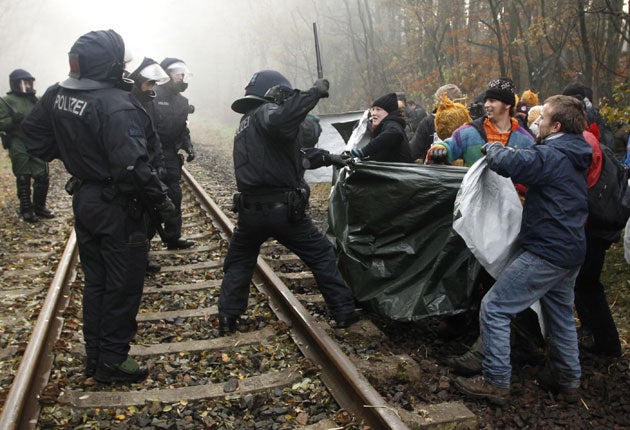German police battle nuclear train protesters

Your support helps us to tell the story
From reproductive rights to climate change to Big Tech, The Independent is on the ground when the story is developing. Whether it's investigating the financials of Elon Musk's pro-Trump PAC or producing our latest documentary, 'The A Word', which shines a light on the American women fighting for reproductive rights, we know how important it is to parse out the facts from the messaging.
At such a critical moment in US history, we need reporters on the ground. Your donation allows us to keep sending journalists to speak to both sides of the story.
The Independent is trusted by Americans across the entire political spectrum. And unlike many other quality news outlets, we choose not to lock Americans out of our reporting and analysis with paywalls. We believe quality journalism should be available to everyone, paid for by those who can afford it.
Your support makes all the difference.Riot police using water cannon, teargas and baton charges fought thousands of demonstrators attempting to halt the shipment of 123 tons of atomic waste to a disputed storage site in northern Germany yesterday.
More than 30,000 protesters took to fields, roads, lanes and railway tracks around the northern town of Danneberg to try to stop the movement – initially by rail and then road – of nuclear waste containers sent from France for storage in a disused salt mine close to the nearby village of Gorleben. The protests, which amounted to one of the largest anti-nuclear demonstrations in Germany for 30 years, were given added momentum by Chancellor Angela Merkel's recent decision to extend the life of the country's 17 nuclear power stations by an average of 12 years.
Wolfgang Ehmke, a spokesman for protesters, said the attempts to disrupt the shipment through blockades and demonstrators chaining themselves to the tracks were not only meant to delay the arrival of atomic waste but were "also meant to mess up the timetable for the government's nuclear policy". Demonstrators used an array of different techniques to try to stop the shipment, which has been called "Chernobyl on wheels". Militant activists tried to rip up the train tracks due to carry the waste shipment by digging out the earth from under the rails.
Squads of helmeted riot police equipped with batons and tear gas grenades tried to disperse the group. They were met by a hail of fireworks and stones. An armoured police vehicle was set ablaze in the clashes.
Police eventually used water cannon to dispel the protesters. They made dozens of arrests. Both sides accused each other of violence. In other incidents, protesters abseiled down to rail tracks from a bridge and chained themselves to the rails. Police were forced to clear away some 60 tractors blocking the main road between Dannenberg and the Gorleben storage site some 12km away.
The waste convoy, which travels 900-miles from the French nuclear reactor site at La Hague in Normandy to Gorleben in Lower Saxony, is the eleventh since 1996. Every shipment has been the focus of protests. In 2004 one demonstrator died after his leg was cut off by a train as he sat on the track.
The decision by Ms Merkel's conservative-liberal coalition to extend the use of nuclear power reverses the policy of former Chancellor Gerhard Schröder's previous coalition of Social Democrats and Greens to phase it out entirely by 2021.
Opinion polls have shown that a majority of Germans is against the nuclear extension but Ms Merkel argues that nuclear power is a "bridging technology" which is needed to cover the country's energy needs while green alternatives are developed. The Greens argue that extending nuclear power removes the incentive to develop environmentally friendly alternatives.
Claudia Roth, a leading Green politician, said at the weekend that her party would make dispensing with nuclear power one of its main campaign issues in the country's 2013 election.
The opposition Greens and the Social Democrats have pledged to fight the nuclear policy switch in Germany's Constitutional Court. Opinion polls suggest that the two parties would easily defeat Ms Merkel's government if an election were held now.
Join our commenting forum
Join thought-provoking conversations, follow other Independent readers and see their replies
Comments